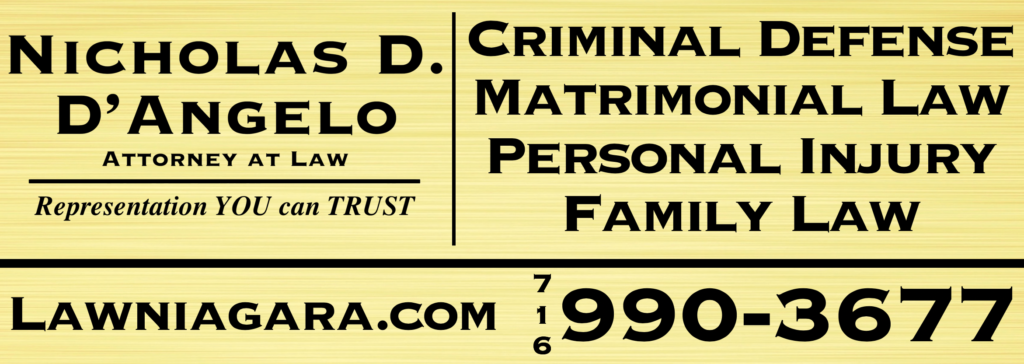Please click the link below to subscribe to a FREE PDF version of each print edition of the Niagara Reporter
http://eepurl.com/dnsYM9

For the first time in New York, non-biological parents have legal rights.
BY: Nicholas D. D’Angelo, Attorney at law
Throughout the history of our country, the law has often been slow to follow social norms.
It took until 1920 for the 19th Amendment to the U.S. Constitution to pass giving women the right to vote.
It took until 1954, in Brown v. Board of Education, for the U.S. Supreme Court to end segregation in schools and abolish the “separate but equal” ruling from Dread Scott v. Sandford that came nearly a century before- in 1857.
It took until 2003, in Lawrence v. Texas, for the U.S. Supreme Court to strike down a Texas sodomy law and, by doing so, make same-sex sexual activity legal in every state.
It took until 2015, in Obergefell v. Hodges, for the U.S. Supreme Court to rule that the fundamental right to marry is guaranteed to same-sex couples throughout the United States.
Suffice to say, sometimes it takes the law a little longer to catch up with certain social norms.
One such social norm the law has been equally slow in recognizing are the rights of non-biological parents, step-parents, or parents in homosexual relationships.
Most of us know someone who has opened their heart to a child who isn’t biologically theirs.
A man who steps into a child’s life and becomes his father.
A woman whose husband has a young child that grows up only knowing her as “mom.”
A grandmother or grandfather who takes on the responsibility of raising a child. A woman who plans, with her wife, to conceive and raise a child.
The situations are endless, and the bonds these often amazing individuals create with their children are life-changing.
Yet, since 1992, in the State of New York, these non-biological parents have had no rights to the children whom they established relationships with.
In 1992 the Court of Appeals decided a case called Alison D. v. Virginia M., where they held that in the absence of a biological or adoptive connection to the child, an individual was not a “parent” and, as such, could not petition a court for custody and visitation of that child.
Despite numerous judges over the years acknowledging the widespread harm this ruling had on families, it was the law of New York until 2016 when the Court of Appeals, in Brooke v. Elizabeth, overruled Alison D..
Consider the following examples:
*********

John starts to date Linda who has a five-month-old child, Michael, whose biological father had abandoned him shortly after birth. John knowingly assumed the role of dad and fulfilled all of the responsibilities traditionally associated with being a father.
Linda, throughout the entire relationship, held John out as his real father to Michael, her own family, friends, teachers, doctors, and etc., and encouraged relationships to be formed between Michael and John’s parents (who became the child’s grandparents), siblings (who became the child’s aunts and uncles), and extended family.
After five years together, however, the couple separated.
Up to that point, Michael knew no other father, “dad,” or “daddy” other than John, and John, for more than five years, had looked at Michael as his son because in every way that mattered, he was.
Not once caring about the devastation it would have on Michael’s life, who was six, Linda followed the advice of an attorney and attempted to sever their bond; withholding Michael from John.
If this had happened before 2016, John would have had no ability to take the woman to family court in an effort to get custody or visitation of Michael. He would have had no rights, no hope, and no son.
**********

Sarah marries Michael who has a one-year-old daughter Nicole. The couple are happily married for three years before tragedy strikes and Michael dies from cancer, leaving Sarah and his daughter Nicole, now four, behind.
Throughout the three years of marriage, and the months leading up to their wedding day, Nicole lived with Sarah.
Being only one when they were married, Nicole grew up calling Sarah “mom” or “mommy,” and Sarah always treated her as if she was her own because in every way that matters, she was.
If this happened before 2016, Sarah would have been in the same boat as
John was in the previous example. Both would have helplessly watched as the biological parent of their child, for no reason that had anything to do with what was in the child’s best interest, severed their bond forever.
***********
For a family law system built on the “best interests of the child,” it’s certainly clear that wasn’t always the outcome when it comes to non-traditional families.
It is hard to imagine children who grew up with fathers or mothers, or other non-biological parental figures, who were helpless, as that non-biological individual, but true mother or father, was taken away from them.
The children were not able, because of their age or the legal system, to do anything about it.
Fortunately, the landscape of family law changed in New York on August 30th, 2016, when the Court of Appeals decided Brooke v. Elizabeth and struck down the court’s prior ruling in Alison D. that prevented a non-biological parent from filing a petition for custody and visitation of their child.
Since the Court of Appeals’ decision in Brooke v. Elizabeth, there have been countless applications made by non-biological parents in both homosexual and heterosexual relationships (the ability for a non-biological parent to petition a family court for custody and visitation applies equally to individuals in both same sex and opposite sex relationships).
Non-biological parental rights is an area of law that is not only close to my heart, but something I have been successful multiple times in arguing on behalf of clients who wished to continue a relationship with their son or daughter.
For more information, or if you need help protecting your rights as a parent and to help you fight for your child, visit www.LawNiagara.com or call Nicholas D. D’Angelo, Esq., today at (716) 990-3677.
Nicholas D. D’Angelo is an attorney in Niagara & Erie County whose practice focuses on matrimonial law, family law, criminal defense, personal injury, and general litigation matters.






















